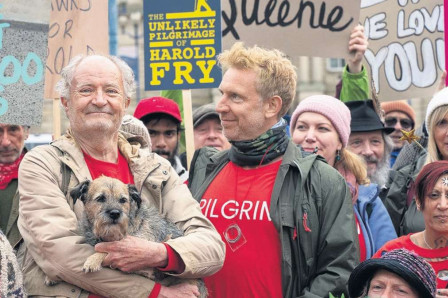
THE TIMES (4 STARS): BIG FILM OF THE WEEK. JIM BROADBENT AND PENELOPE WILTON ARE SUPERB IN THIS MOVING TAKE ON THE NOVEL, SAYS KEVIN MAHER
3rd May, 2023
THE TIMES (4 STARS): BIG FILM OF THE WEEK. JIM BROADBENT AND PENELOPE WILTON ARE SUPERB IN THIS MOVING TAKE ON THE NOVEL, SAYS KEVIN MAHER
3rd May, 2023
The opening shot of this long-awaited literary adaptation is as perfectly chosen, and as filled with symbolic power, as the great opening images of such Hollywood masterpieces as The Searchers (the opened door), Raging Bull (slow-mo De Niro) and Forrest Gump (the feather). It’s the head of a Miele vacuum cleaner, moving methodically over a not especially dirty carpet. That’s all.
And yet in its regimented futility it somehow telegraphs the milieu we’re about to encounter, which is revealed as the breakfast tea, cut grapefruit, net curtains and morning post of a certain type of repressed Little England. Itk a place from which our two retirement-age protagonists, Maureen (Penelope Wilton) and Harold Fry (Jim Broadbent), desperately need to escape.
That morning post, as anyone who’s read Rachel Joyce’s award-winning novel knows, contains a letter from Harold’s dying former work colleague Queenie (Linda Bassett) that launches an expedition. Filled with unexplained guilt, Harold impulsively sets out on a 500-mile trek from his home in Devon to Queenies hospice in Berwick-upon-Tweed, believing that her awareness of his impending arrival will prolong her life. Along the way he will encounter an eclectic ensemble of yokels and (literal) fellow travellers who will deepen his understanding of humanity and of his own conflicted soul.
Good on paper, and worth its place on the Booker longlist, but tricky material for a director to manage. Go too light and it becomes just another patronising grey-pound comedy about the wacky things that old folks do — you know, like enter dance competitions (Finding Your Feet), open cafés (Love Sarah) or fall in love with tramps (Hampstead). Too earnest, however, and it becomes sentimental and sickly, like the recent and similar Timothy Spall pilgrimage movie The Last Bus, which was horribly twee. Thankfully, this adaptation has a secret weapon in Hettie Macdonald. She burst onto the mid-Nineties Brit-film scene with the delicate coming-of-age movie Beautiful Thing but then spent the next 27 years working in telly, directing everything from Casualty to Normal People. Her return to cinema is something to be celebrated, for what she does with Harold Fry, working from a script by Joyce, is nothing short of remarkable. The imagery she creates, and the dreamy, mythological power she invests in it, transforms Harold’s travels into something more ambitious.
His journey across the country is peppered with disturbing expressionistic flashbacks to his failed parenting of troubled son David (Earl Cave). But it’s also a journey back into a pagan, Anglo-Saxon Englishness (folk songs litter the soundtrack) that is alien to Harold and Maureen and their tidy life of Mieles and grapefruit. In one of the film’s most significant and quietly moving scenes Harold washes alone in a forest stream, by a bower, baptising himself in nature. In the book Harold’s ineptitude as a parent is linked to the war years and to his own father’s PTSD. In the film it’s more profound, and seemingly rooted in his disconnection from the land, from the country and from its people. Without the crutch of prose to rely on, Macdonald conveys Harold’s hopelessness as a father with a few wordless yet devastating sequences. The simplest and most effective comes after David’s birth, when Harold stands awkwardly in front of his newborn and, instead of reaching out to embrace him, curls his arms politely behind him, as if inspecting a venomous plant or an especially fancy cake-dressing. The camera closes in on his interlocking fingers. A painful wound writ large.
It helps, of course, to have Broadbent in the role. It’s easily his most commanding turn since playing another errant pop in And When Did You Last See Your Father?. He carries Harold through the movie under a mask of poignant resilience and near unbearable sadness until finally, in a Northumberland café, he delivers the kind of cathartic emotional wallop that will leave most viewers (it did this one) in a puddle of tears.
Wilton is also flawless as Maureen in a film that refuses to cast her as the clichéd lifelong “hen-pecker” but looks at its elderly characters and sees only dignity and endurance. It is immediately one of the great movies about ageing and regret, up there with 45 Years and The Straight Story.
